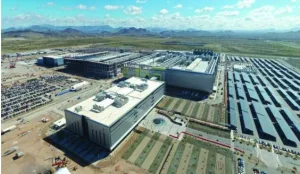Career Transformation at TSMC Arizona: Inside the Semiconductor Giant’s Evolving Workplace Culture

Nolan spent six years at In-N-Out Burger before making a career leap that would transform his professional trajectory. Today, as a process apprentice at Taiwan Semiconductor Manufacturing Company’s Arizona facility, he monitors ion beam equipment that shoots charged particles into transistors — technology crucial for the smartphones, computers, and artificial intelligence systems that power modern life.
“Going from cooking burgers every day to this is like hitting a brick wall. It was a lot to learn,” Nolan told a local news crew during a facility tour. The transition represents more than a personal career shift; it exemplifies the opportunities emerging at TSMC Arizona as the company builds out what will become the largest foreign direct investment in U.S. history at $165 billion.
Management Approach Adapts to U.S. Workforce
Employee accounts from TSMC Arizona reveal a company actively adapting its management style to American workplace expectations. One technician’s experience, shared on Reddit, describes a pivotal moment when traditional expectations met responsive leadership:
“They were willing to work with me and make adjustments so I could thrive more at the company. I don’t know what kind of jobs you are used to working in, but in my experience, this company is so much more willing to change, grow, and make adjustments than any other company I’ve worked for in my entire life. I recognize the great value in this company because of all the crappy places I’d been in the past. I hope to stay with them.”
Structured Career Pathways Through Apprenticeships
TSMC Arizona has invested more than $5 million in registered apprenticeship programs, partnering with institutions including Maricopa Community Colleges, Arizona State University, Northern Arizona University, and Grand Canyon University. The programs span 18 to 24 months and cover four technical specializations: facilities technician, equipment technician, process technician, and manufacturing technician specialist.
For Nolan, the apprenticeship meant paid training without student debt. “I’m going through and everything’s being taken care of by TSMC and the government because of the apprenticeship, and I couldn’t be more fortunate to not have to worry about student loans,” he explained. The company plans to add approximately 130 apprentices to the program in 2025, with cohorts starting work in April.
These apprenticeships combine full-time employment with classroom instruction and on-the-job training. Participants earn competitive wages while working toward industry certifications, with opportunities to pursue associate degrees. The first cohort of facilities technician apprentices began in April 2024, earning their on-the-job training hours while attending courses at Estrella Mountain Community College.
Cultural Bridge-Building Through Experience
Jefferson Patz, one of TSMC Arizona’s first hires in 2021, spent 18 months training at TSMC facilities in Taiwan before returning to help establish operations in Phoenix. His observations about workplace culture differences have informed the company’s adaptation strategies.
“American workers are more likely to question an end goal before getting into the nitty-gritty of how to achieve it. Taiwanese workers are almost always aligned on a goal and dive into solution brainstorming,” Patz told Axios. He noted that blending these approaches “has paid dividends and illustrates the power of merging customs, rather than insisting one way is better than the other.”
More than 400 American engineers have traveled to Taiwan for training as part of TSMC’s knowledge transfer process. The cross-cultural exchange works both ways, with the company implementing communications training for managers to better work with U.S. employees.
Compensation and Growth Opportunities
While specific salary figures vary by role and experience, apprentices describe the compensation as transformative. Nolan projects that in 10 years, as a senior process technician, he will be “making a relatively high salary and making sure that everything runs as comfortably as it can.”
The career progression at TSMC Arizona follows a structured path. With plans for six phases of construction over the next decade, engineers anticipate opportunities to work on progressively advanced technology nodes. The facility currently produces 4-nanometer chips, with plans to manufacture 2-nanometer chips before the end of the decade — technology at the absolute cutting edge of semiconductor manufacturing.
Rose Castanares, president of TSMC Arizona, emphasized the company’s local commitment: “We are deeply committed to creating job opportunities for local Arizonans. Our newest technician apprentices will get the support and training they need to thrive in their new careers and help us make the most advanced semiconductor technology in the United States”.
Industry Context and Future Outlook
TSMC’s workforce development efforts occur against the backdrop of projected semiconductor industry growth. The Semiconductor Industry Association forecasts the sector will add approximately 460,000 jobs by 2030, representing 33% growth from current levels.
For employees like Nolan, who made the transition from food service to semiconductor manufacturing, the opportunity represents more than a job change. “This industry is growing so rapidly. Currently, we’re only seeing a fraction of what this industry will become in the future with the right infrastructure and engagement,” he observed. “Once everything’s built here, it’ll be just booming.”
The company’s commitment to adapting its workplace culture while maintaining manufacturing excellence positions TSMC Arizona as a case study in international business operations. As production ramps up through 2025 and beyond, the facility’s success in blending Taiwanese technical expertise with American workplace expectations will likely influence how global semiconductor companies approach U.S. operations.
Through structured apprenticeships, responsive management, and substantial investment in workforce development, TSMC Arizona demonstrates that advanced manufacturing can create accessible career pathways for workers from diverse backgrounds — even those transitioning from preparing burgers to producing the chips that power the digital economy.
